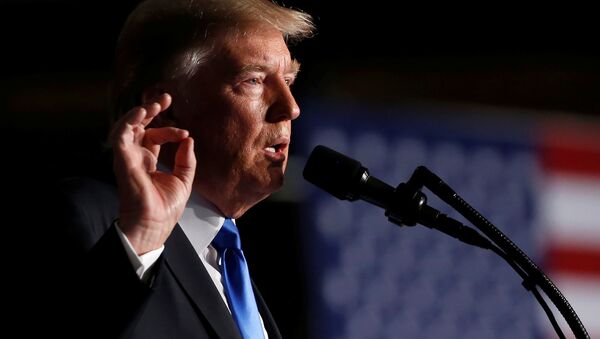"The fact is, Donald Trump has been stymied in his clear desire to improve ties with Russia," Jatras said. "He still says he hopes to do that, but now he adds ‘someday’ and ‘eventually’. The generals and globalists are firmly in charge of his foreign and security policy, and Trump knows it."
Jatras noted that the continued moves by the US government and Congress to ratchet up diplomatic and economic pressure against Russia flew in the face of Trump’s own preferences for improved relations with Moscow that he repeatedly expressed during his presidential campaign last year.
Trump’s loss of control over his own administration’s security agenda "explains not only keeping the pressure up on Russia on sanctions (an un-veto-able bill imposed on him by Congress) and re-doubling our commitment to NATO (which he once called ‘obsolete’)," Jatras said.
In June, Congress passed a new sanctions bill against Russia by almost unanimous votes of 415-3 in the House of Representatives and 98-2 in the Senate.
Jatras said political pressure from both Republicans and Democrats backed by a non-stop onslaught in the US media had forced Trump into accepting and publicly supporting policies he had long opposed.
These included "partnering with Saudi Arabia against terrorism (absurd on its face), staying the course in Afghanistan (against what he admits was his own instinct) and moving ever closer to the abyss [of potential nuclear war] on Korea," he said.
The long inquiry into Trump’s alleged ties to Russia being pursued by former Federal Bureau of Investigation (FBI) Director and Special Prosecutor Robert Mueller added to the pressures on the president, Jatras noted.
"Add… the continuing baseless ‘RussiaGate’ coup being conducted by Robert Mueller and there’s little room to expect improvement. On foreign policy, the so-called swamp has won. Sad." Jatras said.
Trump was now trapped into supporting and maintaining hostile US relations with Russia, Jatras observed.
"The impact of the US closing of the Russian Federation’s San Francisco consulate is simply put: It’s just another symptom of the undeniable fact that we are in a new Cold War, we have been for some time, and we are not getting out of it any time soon," he said.
Jatras also noted that US officials had justified the diplomatic closures announced on Thursday as "parity" in the number of consulates in each country to match Moscow’s lowering the number of US personnel in Russia to equal the number of Russian staff in the United States.
However, in reality, the latest US move had clearly anticipated and provoked a further Russian reaction, he pointed out.
"Keep in mind that despite the State Department’s calling for ‘restraint’ and seeking to hoist Moscow on its own rhetorical petard regarding ‘reciprocity,’ this action… will no doubt lead to another response. It almost doesn’t matter what it is. The only real question is ‘How bad does it get?’" Jatras said.
The United States has reduced the size of its staff at the US Embassy in Russia by 455 people as instructed by Moscow in July as a response to the 2016 expulsion of 35 Russian diplomats and sanctions against Russia passed by the US Congress in July, the State Department said.





